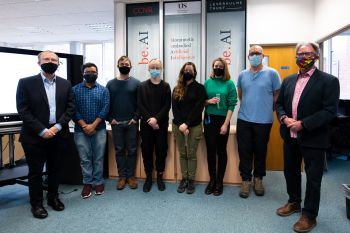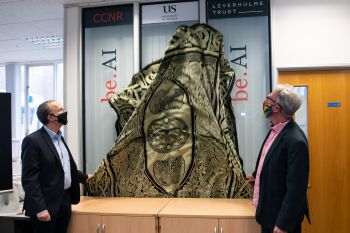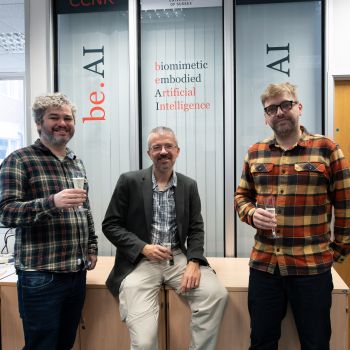News
New nature-inspired AI doctoral programme officially opens
By: Neil Vowles
Last updated: Thursday, 9 December 2021

Prof Keith Jones (left) and Prof Ian Wakeman (right) flank the six new be.AI scholars

Prof Keith Jones (left) and Prof Ian Wakeman (right) revealing the programme's logo

Prof Andy Philipiddes(left), Prof Thomas Nowotny (Centre) and Prof Paul Graham (Right) toast the official opening of the programme
A new doctoral scholarship programme developing next generation AI capable of emulating biological intelligence has been officially opened at the University of Sussex.
The first cohort of students have been welcomed on to the be.AI Leverhulme Doctoral Scholarship Programme in a ribbon-cutting ceremony to mark the opening of the new be.AI student space in the Arundel building on campus.
The be.AI programme will run for seven-and-a-half years with three intakes of six students every September for the next three years 2021, 2022, 2023
The three-and-a-half year studentships, hosted within the AI Research Group of the Department of Informatics and the interdisciplinary Centre for Computational Neuroscience and Robotics (CCNR), are financed by a £1.35 million Leverhulme Trust grant and supported with co-funding from the Sussex Doctoral School.
The be.AI programme, which stands for biomimetic embodied artificial intelligence, will be directed by Prof Thomas Nowotny and Prof Andy Philippides in the School of Engineering and Informatics and Prof Paul Graham from the School of Life Sciences. Prof Margaret Boden has been named honorary head of be.AI and is a member of the advisory board.
Students will be co-supervised by supervisors from a variety of Schools and Departments beyond Engineering and Informatics, including Life Sciences, Psychology and Media, Arts and Humanities.
Prof Nowotny, Professor of Informatics at the University of Sussex, said: “Our programme will train the next generation of leading AI scientists to follow artificial intelligence’s original definition: a description and emulation of biological learning and intelligence that both replicates animals’ capabilities in autonomous systems and sheds light on the biological basis of intelligence.
“To build next generation AI systems of sufficient robustness and flexibility, we will need to move beyond replicating neural mechanisms in algorithmic form and develop a deep understanding of the nested and tightly coupled interactions among brains, bodies, and environments.
“Our work will build on a well-established and distinctive Sussex strength at the interface of biology, cognitive science and machine learning.”
Prof Keith Jones, Pro-Vice Chancellor for Research & Enterprise at the University of Sussex, said: “I was delighted to be at the opening ceremony of the Leverhulme Scholarship Programme in AI. The six students have ambitious and multidisciplinary projects spanning biology, cognitive science and machine learning. This is an exemplary programme and with the continued recruitment of talented students will bring great research success to everyone involved.”
The new be.AI scholars include:
Amany Amin
Swarm exploration: multi-robot visual navigation through insect-inspired strategies
Supervised by Prof Andy Philippides (Informatics) and Prof Paul Graham (Life Sciences)
Ben White
The Role of AI in Digital Space and Human Niche Construction: An Extended Predictive Processing Account.
Supervised by Prof Andy Clark (Philosophy) and Beatrice Fazi (MAH)
Anindya Ghosh:
Building bio-mimetic algorithms by injecting function into brain models
Supervised by Dr James Knight (Informatics) and Prof Thomas Nowotny (Informatics)
Hanna Moody
Modelling the first step
Supervised by Prof Luc Berthouze (Informatics) and Simon Farmer (UCL)
Eira Watts-Moore
Individual differences in spectral processing in fish: nature or nurture?
Supervised by Prof Tom Baden (Life Sciences) and Dr Jenny Bosten (Psychology)
Steve Symons
Creating shared cognitive spaces to explore performer musical voice.
Supervised by Prof Thor Magnussen (MAH) and Dr Chris Kiefer (MAH)
Contact
media-arts-humanities@sussex.ac.uk
+44 (0)1273 678001